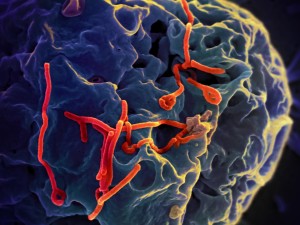According to the World Health Organization (WHO), the Ebola virus disease, formally known as Ebola hemorrhagic fever, has taken approximately 9,700 lives since the first outbreak in 2014. Due to the high mortality rate, it is now classified as a “Risk Group Four Pathogen,” in accordance with the WHO pathogenicity standards.
 In regard to geography, the majority of cases are confined to countries in West Africa—namely Sierra Leone, Liberia, and Guinea— with exceptions of a few minor cross-cultural outbreaks.
In regard to geography, the majority of cases are confined to countries in West Africa—namely Sierra Leone, Liberia, and Guinea— with exceptions of a few minor cross-cultural outbreaks.
However, in recent news, reports are showing a drastic decline in case numbers. Last week, WHO reported only five new cases in Liberia. This improvement has led the government to reopen schools for the first time in months, according to CNN news.
But not all Liberians are keen this immediate step towards “recovery,” and instead deem it as merely fostering a “relapse.”
To get a better understanding of this discrepancy, a personal interview was held last week with Liberia-stationed worker, Armando Costabile, to get a first-hand insight on the problem.
Costabile stated how he fears that the reopening of schools may have some adverse effects on the country. Moreover, he believes safety and caution should come first.
“While the thought of reopening schools appears as a positive landmark, I am weary of the backfire it could have, being this soon.”
Costabile continued his statement by referring to the “cycle of disease” he has witnessed over the years, “Ebola is not new to the Liberians. Outbreaks have occurred in cycles for over a decade.”
He further described the framework of this ‘disease cycle’ in his next statement, “A disease hits, people go into panic, help comes, the hype dwindles down, and people go right back to unsafe contact as if it did not happen.”
While Costabile claimed there are multiple factors playing into this problem, he subsequently highlighted the issue of culture,“I think one of the problems lies with cultural mindsets. This is a culture that lives the moment. While this has great aspects to it, it can often lead to forgetting everything of the past a little too quickly…”
 Costabile also described the issue with quarantines, and how there are “always one or two tribesmen who were missed and retreat to the bush.” Thus, the cultivation for a relapse begins. In other words, the disease “hides for a few years in the Bush, slowly leaks back into the city, and eventually outbreaks once again.” He states that it is the “nature of a virus.”
Costabile also described the issue with quarantines, and how there are “always one or two tribesmen who were missed and retreat to the bush.” Thus, the cultivation for a relapse begins. In other words, the disease “hides for a few years in the Bush, slowly leaks back into the city, and eventually outbreaks once again.” He states that it is the “nature of a virus.”
On a brighter note, in comparison to past outbreaks, Costabile is a little more hopeful this time with the new enactment of U.S. screenings. According to Costabile, this is the “most orderly and effective screening” he has ever witnessed.
Additionally, on February 8, 2015, WHO released another statement with news of a projected mass vaccination to counteract the crisis. Though the program is currently undergoing clinical trials, it is said that it will be fully decided on in August of this year.
Costabile is set to return to Liberia within the next month. Follow up interviews will be conducted to chart the progress, and/or demise. Only time will tell if the Ebola virus is truly concluding its existence.
